Business Law Assessment 1: UK Legal System and Employment Law, BMP4002
VerifiedAdded on 2023/06/06
|9
|2495
|225
Report
AI Summary
This report, prepared for a Business Law assessment (BMP4002), provides a detailed overview of the UK legal system. It begins by defining laws and classifying them into civil and criminal categories, explaining the roles of the High Court and Supreme Court. The report then explores the sources of law, including case law and legislation, along with the process of making legislation and the concept of delegated legislation. The final section focuses on UK employment law, outlining the statutory duties of employers and differentiating between wrongful and unfair dismissal. The report aims to provide a comprehensive understanding of the legal framework governing businesses in the UK, covering various aspects from the fundamental classifications of law to the specifics of employment regulations.
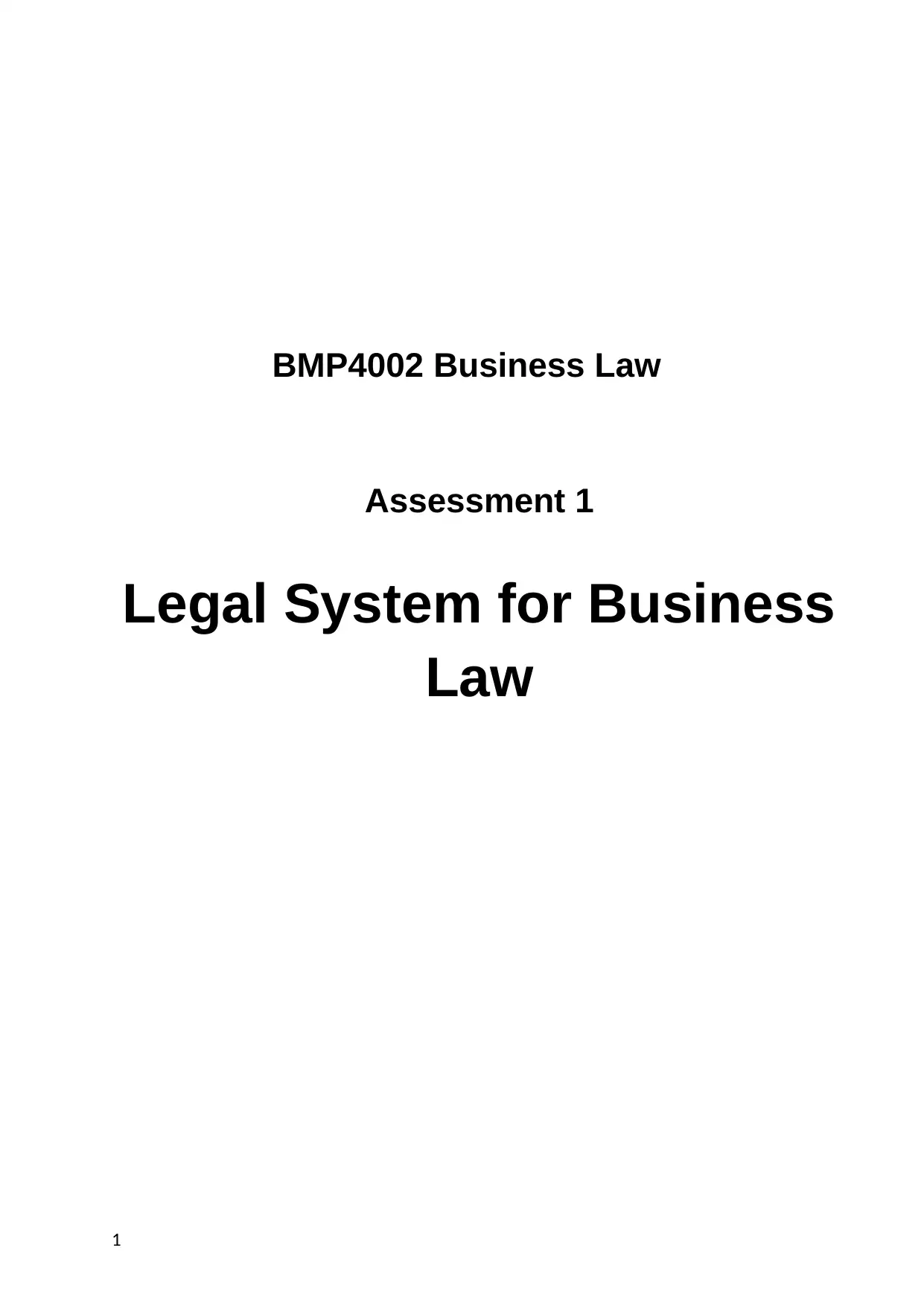
BMP4002 Business Law
Assessment 1
Legal System for Business
Law
1
Assessment 1
Legal System for Business
Law
1
Paraphrase This Document
Need a fresh take? Get an instant paraphrase of this document with our AI Paraphraser
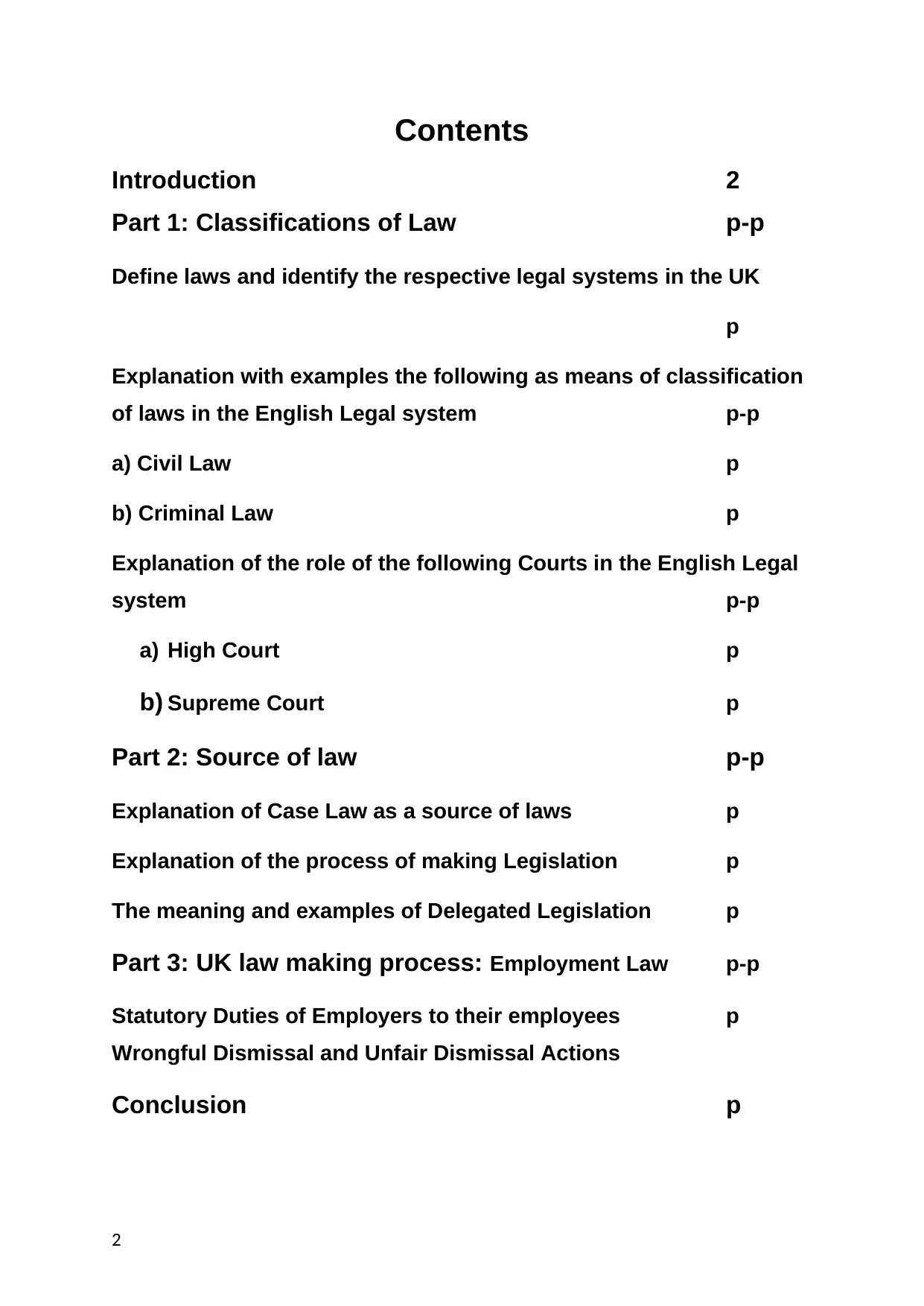
Contents
Introduction 2
Part 1: Classifications of Law p-p
Define laws and identify the respective legal systems in the UK
p
Explanation with examples the following as means of classification
of laws in the English Legal system p-p
a) Civil Law p
b) Criminal Law p
Explanation of the role of the following Courts in the English Legal
system p-p
a) High Court p
b) Supreme Court p
Part 2: Source of law p-p
Explanation of Case Law as a source of laws p
Explanation of the process of making Legislation p
The meaning and examples of Delegated Legislation p
Part 3: UK law making process: Employment Law p-p
Statutory Duties of Employers to their employees p
Wrongful Dismissal and Unfair Dismissal Actions
Conclusion p
2
Introduction 2
Part 1: Classifications of Law p-p
Define laws and identify the respective legal systems in the UK
p
Explanation with examples the following as means of classification
of laws in the English Legal system p-p
a) Civil Law p
b) Criminal Law p
Explanation of the role of the following Courts in the English Legal
system p-p
a) High Court p
b) Supreme Court p
Part 2: Source of law p-p
Explanation of Case Law as a source of laws p
Explanation of the process of making Legislation p
The meaning and examples of Delegated Legislation p
Part 3: UK law making process: Employment Law p-p
Statutory Duties of Employers to their employees p
Wrongful Dismissal and Unfair Dismissal Actions
Conclusion p
2
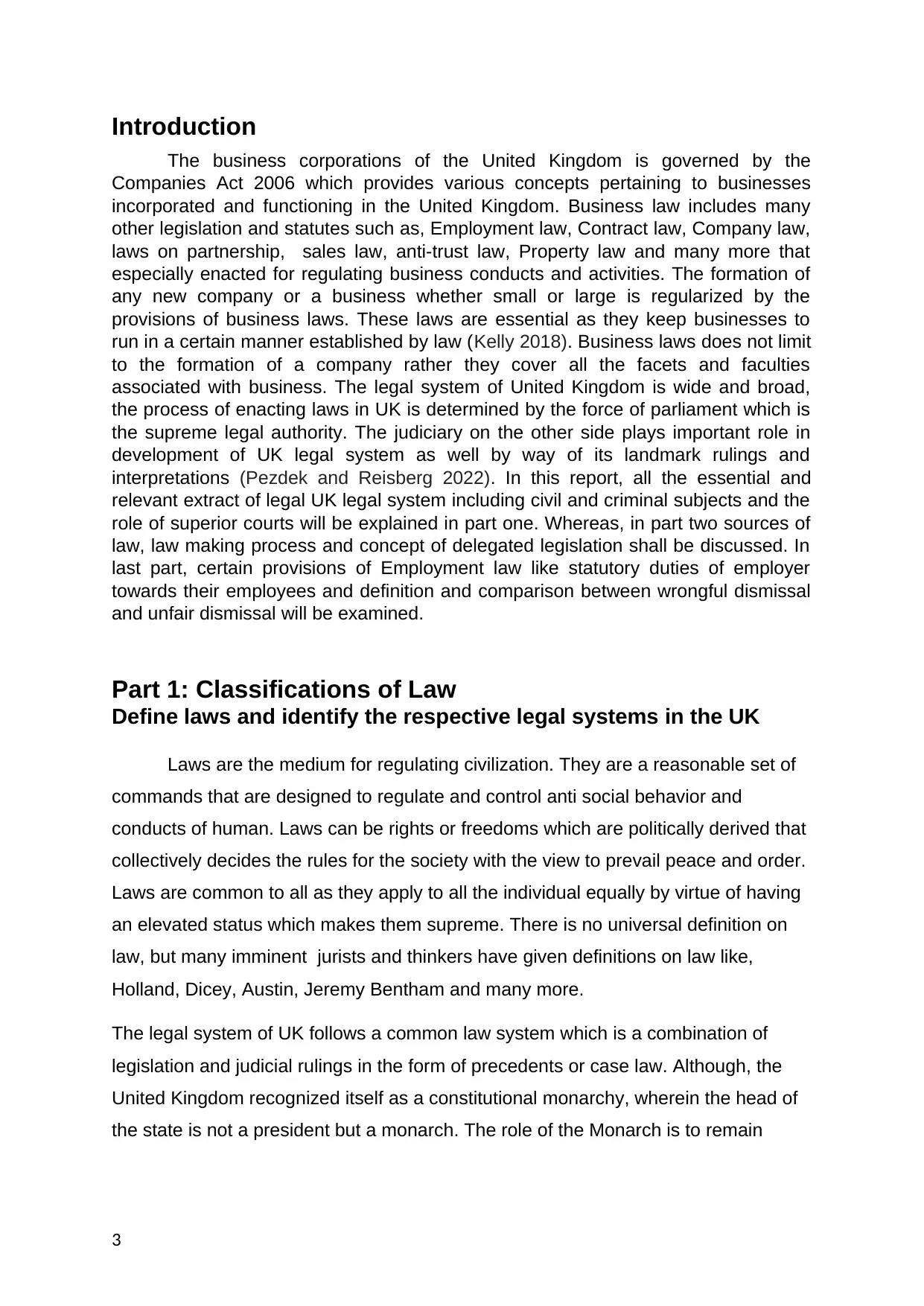
Introduction
The business corporations of the United Kingdom is governed by the
Companies Act 2006 which provides various concepts pertaining to businesses
incorporated and functioning in the United Kingdom. Business law includes many
other legislation and statutes such as, Employment law, Contract law, Company law,
laws on partnership, sales law, anti-trust law, Property law and many more that
especially enacted for regulating business conducts and activities. The formation of
any new company or a business whether small or large is regularized by the
provisions of business laws. These laws are essential as they keep businesses to
run in a certain manner established by law (Kelly 2018). Business laws does not limit
to the formation of a company rather they cover all the facets and faculties
associated with business. The legal system of United Kingdom is wide and broad,
the process of enacting laws in UK is determined by the force of parliament which is
the supreme legal authority. The judiciary on the other side plays important role in
development of UK legal system as well by way of its landmark rulings and
interpretations (Pezdek and Reisberg 2022). In this report, all the essential and
relevant extract of legal UK legal system including civil and criminal subjects and the
role of superior courts will be explained in part one. Whereas, in part two sources of
law, law making process and concept of delegated legislation shall be discussed. In
last part, certain provisions of Employment law like statutory duties of employer
towards their employees and definition and comparison between wrongful dismissal
and unfair dismissal will be examined.
Part 1: Classifications of Law
Define laws and identify the respective legal systems in the UK
Laws are the medium for regulating civilization. They are a reasonable set of
commands that are designed to regulate and control anti social behavior and
conducts of human. Laws can be rights or freedoms which are politically derived that
collectively decides the rules for the society with the view to prevail peace and order.
Laws are common to all as they apply to all the individual equally by virtue of having
an elevated status which makes them supreme. There is no universal definition on
law, but many imminent jurists and thinkers have given definitions on law like,
Holland, Dicey, Austin, Jeremy Bentham and many more.
The legal system of UK follows a common law system which is a combination of
legislation and judicial rulings in the form of precedents or case law. Although, the
United Kingdom recognized itself as a constitutional monarchy, wherein the head of
the state is not a president but a monarch. The role of the Monarch is to remain
3
The business corporations of the United Kingdom is governed by the
Companies Act 2006 which provides various concepts pertaining to businesses
incorporated and functioning in the United Kingdom. Business law includes many
other legislation and statutes such as, Employment law, Contract law, Company law,
laws on partnership, sales law, anti-trust law, Property law and many more that
especially enacted for regulating business conducts and activities. The formation of
any new company or a business whether small or large is regularized by the
provisions of business laws. These laws are essential as they keep businesses to
run in a certain manner established by law (Kelly 2018). Business laws does not limit
to the formation of a company rather they cover all the facets and faculties
associated with business. The legal system of United Kingdom is wide and broad,
the process of enacting laws in UK is determined by the force of parliament which is
the supreme legal authority. The judiciary on the other side plays important role in
development of UK legal system as well by way of its landmark rulings and
interpretations (Pezdek and Reisberg 2022). In this report, all the essential and
relevant extract of legal UK legal system including civil and criminal subjects and the
role of superior courts will be explained in part one. Whereas, in part two sources of
law, law making process and concept of delegated legislation shall be discussed. In
last part, certain provisions of Employment law like statutory duties of employer
towards their employees and definition and comparison between wrongful dismissal
and unfair dismissal will be examined.
Part 1: Classifications of Law
Define laws and identify the respective legal systems in the UK
Laws are the medium for regulating civilization. They are a reasonable set of
commands that are designed to regulate and control anti social behavior and
conducts of human. Laws can be rights or freedoms which are politically derived that
collectively decides the rules for the society with the view to prevail peace and order.
Laws are common to all as they apply to all the individual equally by virtue of having
an elevated status which makes them supreme. There is no universal definition on
law, but many imminent jurists and thinkers have given definitions on law like,
Holland, Dicey, Austin, Jeremy Bentham and many more.
The legal system of UK follows a common law system which is a combination of
legislation and judicial rulings in the form of precedents or case law. Although, the
United Kingdom recognized itself as a constitutional monarchy, wherein the head of
the state is not a president but a monarch. The role of the Monarch is to remain
3
⊘ This is a preview!⊘
Do you want full access?
Subscribe today to unlock all pages.

Trusted by 1+ million students worldwide
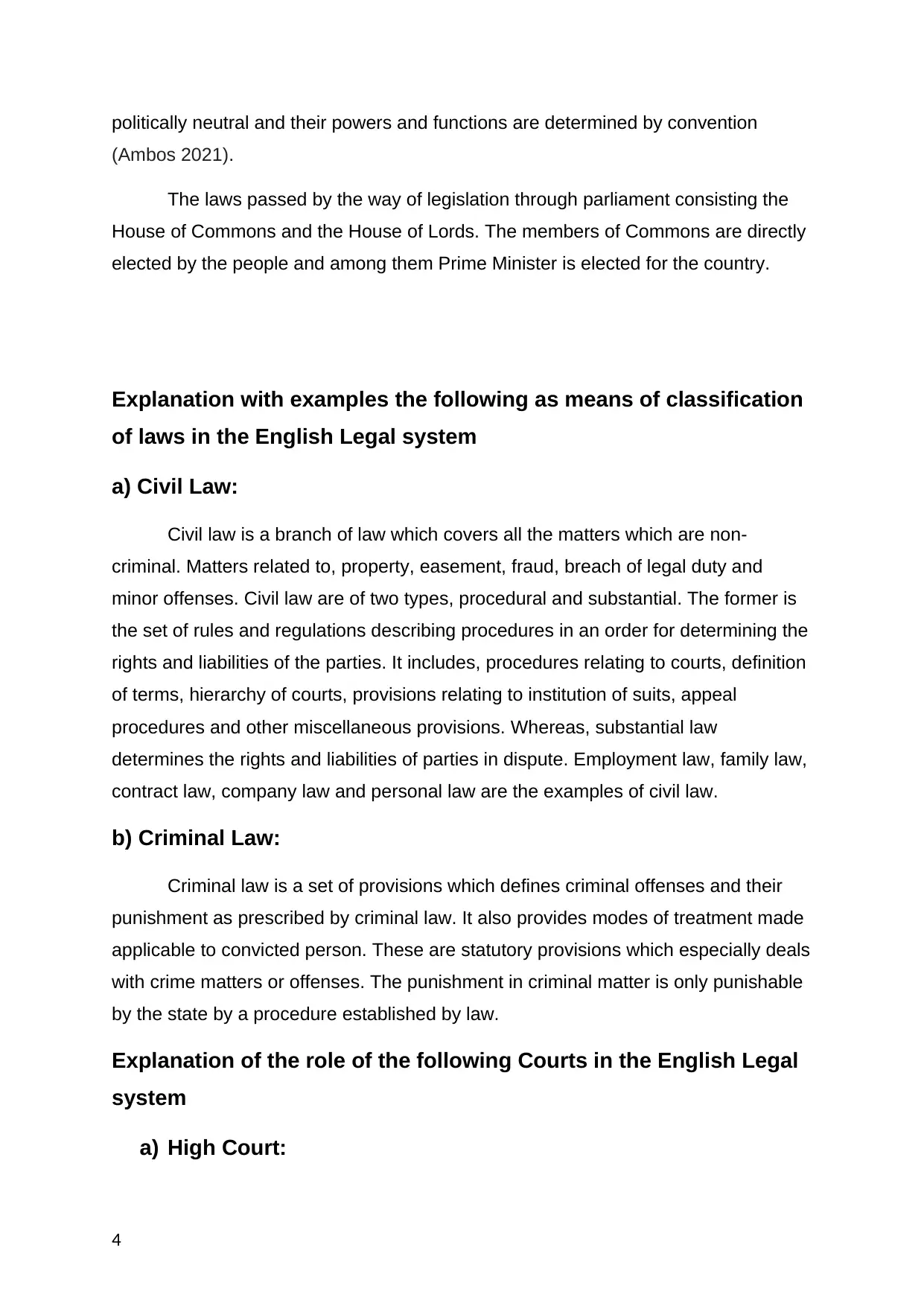
politically neutral and their powers and functions are determined by convention
(Ambos 2021).
The laws passed by the way of legislation through parliament consisting the
House of Commons and the House of Lords. The members of Commons are directly
elected by the people and among them Prime Minister is elected for the country.
Explanation with examples the following as means of classification
of laws in the English Legal system
a) Civil Law:
Civil law is a branch of law which covers all the matters which are non-
criminal. Matters related to, property, easement, fraud, breach of legal duty and
minor offenses. Civil law are of two types, procedural and substantial. The former is
the set of rules and regulations describing procedures in an order for determining the
rights and liabilities of the parties. It includes, procedures relating to courts, definition
of terms, hierarchy of courts, provisions relating to institution of suits, appeal
procedures and other miscellaneous provisions. Whereas, substantial law
determines the rights and liabilities of parties in dispute. Employment law, family law,
contract law, company law and personal law are the examples of civil law.
b) Criminal Law:
Criminal law is a set of provisions which defines criminal offenses and their
punishment as prescribed by criminal law. It also provides modes of treatment made
applicable to convicted person. These are statutory provisions which especially deals
with crime matters or offenses. The punishment in criminal matter is only punishable
by the state by a procedure established by law.
Explanation of the role of the following Courts in the English Legal
system
a) High Court:
4
(Ambos 2021).
The laws passed by the way of legislation through parliament consisting the
House of Commons and the House of Lords. The members of Commons are directly
elected by the people and among them Prime Minister is elected for the country.
Explanation with examples the following as means of classification
of laws in the English Legal system
a) Civil Law:
Civil law is a branch of law which covers all the matters which are non-
criminal. Matters related to, property, easement, fraud, breach of legal duty and
minor offenses. Civil law are of two types, procedural and substantial. The former is
the set of rules and regulations describing procedures in an order for determining the
rights and liabilities of the parties. It includes, procedures relating to courts, definition
of terms, hierarchy of courts, provisions relating to institution of suits, appeal
procedures and other miscellaneous provisions. Whereas, substantial law
determines the rights and liabilities of parties in dispute. Employment law, family law,
contract law, company law and personal law are the examples of civil law.
b) Criminal Law:
Criminal law is a set of provisions which defines criminal offenses and their
punishment as prescribed by criminal law. It also provides modes of treatment made
applicable to convicted person. These are statutory provisions which especially deals
with crime matters or offenses. The punishment in criminal matter is only punishable
by the state by a procedure established by law.
Explanation of the role of the following Courts in the English Legal
system
a) High Court:
4
Paraphrase This Document
Need a fresh take? Get an instant paraphrase of this document with our AI Paraphraser
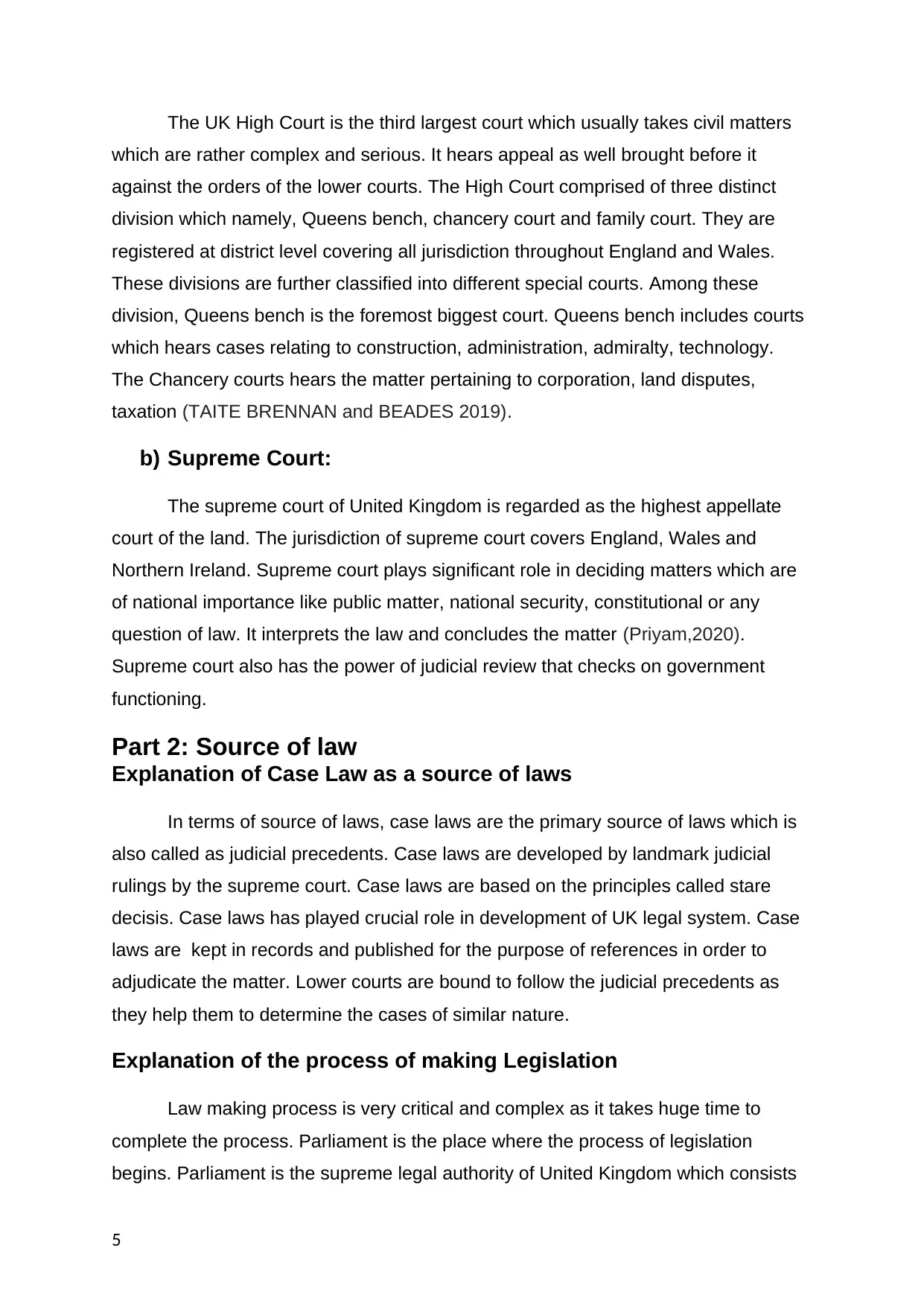
The UK High Court is the third largest court which usually takes civil matters
which are rather complex and serious. It hears appeal as well brought before it
against the orders of the lower courts. The High Court comprised of three distinct
division which namely, Queens bench, chancery court and family court. They are
registered at district level covering all jurisdiction throughout England and Wales.
These divisions are further classified into different special courts. Among these
division, Queens bench is the foremost biggest court. Queens bench includes courts
which hears cases relating to construction, administration, admiralty, technology.
The Chancery courts hears the matter pertaining to corporation, land disputes,
taxation (TAITE BRENNAN and BEADES 2019).
b) Supreme Court:
The supreme court of United Kingdom is regarded as the highest appellate
court of the land. The jurisdiction of supreme court covers England, Wales and
Northern Ireland. Supreme court plays significant role in deciding matters which are
of national importance like public matter, national security, constitutional or any
question of law. It interprets the law and concludes the matter (Priyam,2020).
Supreme court also has the power of judicial review that checks on government
functioning.
Part 2: Source of law
Explanation of Case Law as a source of laws
In terms of source of laws, case laws are the primary source of laws which is
also called as judicial precedents. Case laws are developed by landmark judicial
rulings by the supreme court. Case laws are based on the principles called stare
decisis. Case laws has played crucial role in development of UK legal system. Case
laws are kept in records and published for the purpose of references in order to
adjudicate the matter. Lower courts are bound to follow the judicial precedents as
they help them to determine the cases of similar nature.
Explanation of the process of making Legislation
Law making process is very critical and complex as it takes huge time to
complete the process. Parliament is the place where the process of legislation
begins. Parliament is the supreme legal authority of United Kingdom which consists
5
which are rather complex and serious. It hears appeal as well brought before it
against the orders of the lower courts. The High Court comprised of three distinct
division which namely, Queens bench, chancery court and family court. They are
registered at district level covering all jurisdiction throughout England and Wales.
These divisions are further classified into different special courts. Among these
division, Queens bench is the foremost biggest court. Queens bench includes courts
which hears cases relating to construction, administration, admiralty, technology.
The Chancery courts hears the matter pertaining to corporation, land disputes,
taxation (TAITE BRENNAN and BEADES 2019).
b) Supreme Court:
The supreme court of United Kingdom is regarded as the highest appellate
court of the land. The jurisdiction of supreme court covers England, Wales and
Northern Ireland. Supreme court plays significant role in deciding matters which are
of national importance like public matter, national security, constitutional or any
question of law. It interprets the law and concludes the matter (Priyam,2020).
Supreme court also has the power of judicial review that checks on government
functioning.
Part 2: Source of law
Explanation of Case Law as a source of laws
In terms of source of laws, case laws are the primary source of laws which is
also called as judicial precedents. Case laws are developed by landmark judicial
rulings by the supreme court. Case laws are based on the principles called stare
decisis. Case laws has played crucial role in development of UK legal system. Case
laws are kept in records and published for the purpose of references in order to
adjudicate the matter. Lower courts are bound to follow the judicial precedents as
they help them to determine the cases of similar nature.
Explanation of the process of making Legislation
Law making process is very critical and complex as it takes huge time to
complete the process. Parliament is the place where the process of legislation
begins. Parliament is the supreme legal authority of United Kingdom which consists
5
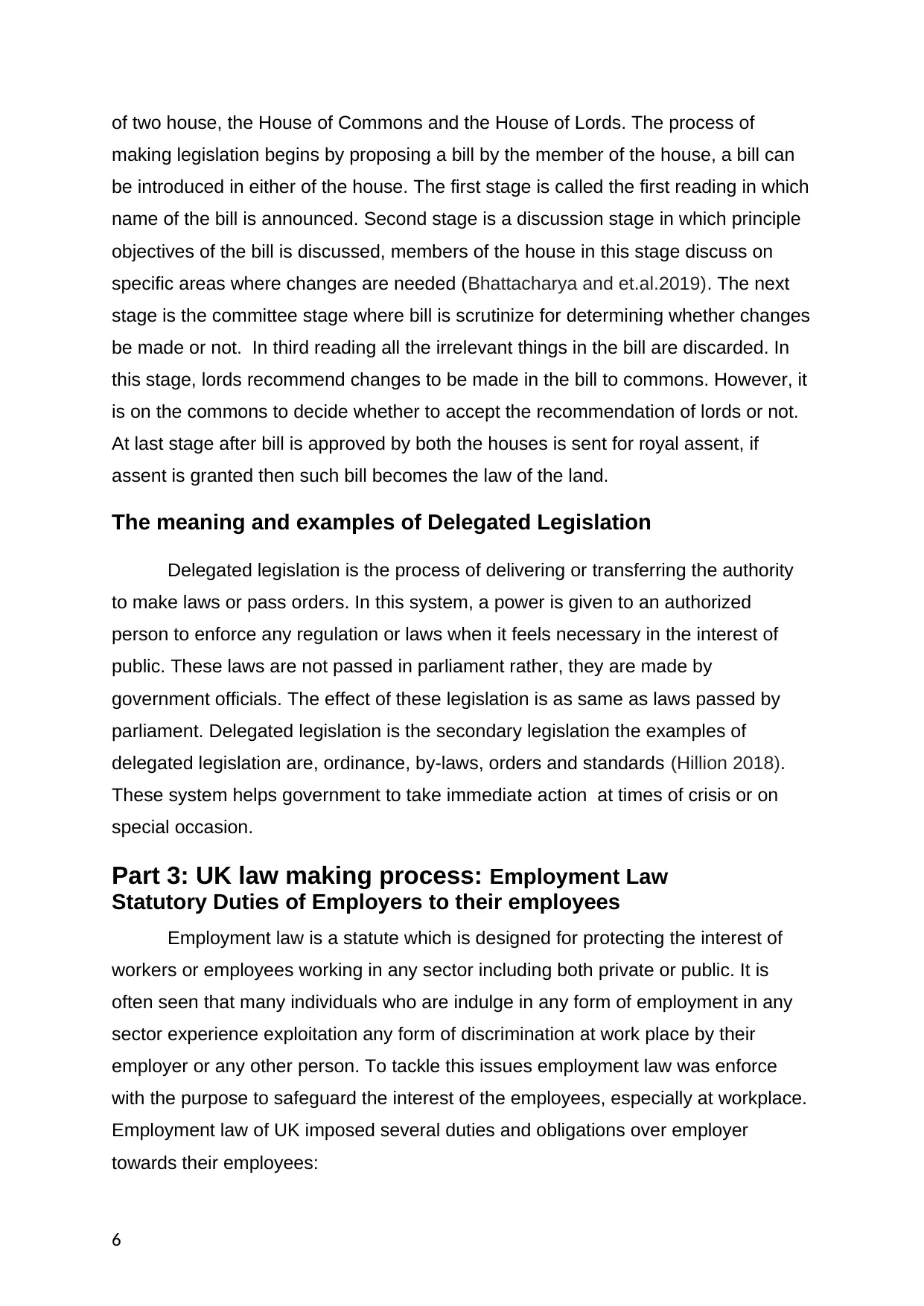
of two house, the House of Commons and the House of Lords. The process of
making legislation begins by proposing a bill by the member of the house, a bill can
be introduced in either of the house. The first stage is called the first reading in which
name of the bill is announced. Second stage is a discussion stage in which principle
objectives of the bill is discussed, members of the house in this stage discuss on
specific areas where changes are needed (Bhattacharya and et.al.2019). The next
stage is the committee stage where bill is scrutinize for determining whether changes
be made or not. In third reading all the irrelevant things in the bill are discarded. In
this stage, lords recommend changes to be made in the bill to commons. However, it
is on the commons to decide whether to accept the recommendation of lords or not.
At last stage after bill is approved by both the houses is sent for royal assent, if
assent is granted then such bill becomes the law of the land.
The meaning and examples of Delegated Legislation
Delegated legislation is the process of delivering or transferring the authority
to make laws or pass orders. In this system, a power is given to an authorized
person to enforce any regulation or laws when it feels necessary in the interest of
public. These laws are not passed in parliament rather, they are made by
government officials. The effect of these legislation is as same as laws passed by
parliament. Delegated legislation is the secondary legislation the examples of
delegated legislation are, ordinance, by-laws, orders and standards (Hillion 2018).
These system helps government to take immediate action at times of crisis or on
special occasion.
Part 3: UK law making process: Employment Law
Statutory Duties of Employers to their employees
Employment law is a statute which is designed for protecting the interest of
workers or employees working in any sector including both private or public. It is
often seen that many individuals who are indulge in any form of employment in any
sector experience exploitation any form of discrimination at work place by their
employer or any other person. To tackle this issues employment law was enforce
with the purpose to safeguard the interest of the employees, especially at workplace.
Employment law of UK imposed several duties and obligations over employer
towards their employees:
6
making legislation begins by proposing a bill by the member of the house, a bill can
be introduced in either of the house. The first stage is called the first reading in which
name of the bill is announced. Second stage is a discussion stage in which principle
objectives of the bill is discussed, members of the house in this stage discuss on
specific areas where changes are needed (Bhattacharya and et.al.2019). The next
stage is the committee stage where bill is scrutinize for determining whether changes
be made or not. In third reading all the irrelevant things in the bill are discarded. In
this stage, lords recommend changes to be made in the bill to commons. However, it
is on the commons to decide whether to accept the recommendation of lords or not.
At last stage after bill is approved by both the houses is sent for royal assent, if
assent is granted then such bill becomes the law of the land.
The meaning and examples of Delegated Legislation
Delegated legislation is the process of delivering or transferring the authority
to make laws or pass orders. In this system, a power is given to an authorized
person to enforce any regulation or laws when it feels necessary in the interest of
public. These laws are not passed in parliament rather, they are made by
government officials. The effect of these legislation is as same as laws passed by
parliament. Delegated legislation is the secondary legislation the examples of
delegated legislation are, ordinance, by-laws, orders and standards (Hillion 2018).
These system helps government to take immediate action at times of crisis or on
special occasion.
Part 3: UK law making process: Employment Law
Statutory Duties of Employers to their employees
Employment law is a statute which is designed for protecting the interest of
workers or employees working in any sector including both private or public. It is
often seen that many individuals who are indulge in any form of employment in any
sector experience exploitation any form of discrimination at work place by their
employer or any other person. To tackle this issues employment law was enforce
with the purpose to safeguard the interest of the employees, especially at workplace.
Employment law of UK imposed several duties and obligations over employer
towards their employees:
6
⊘ This is a preview!⊘
Do you want full access?
Subscribe today to unlock all pages.

Trusted by 1+ million students worldwide
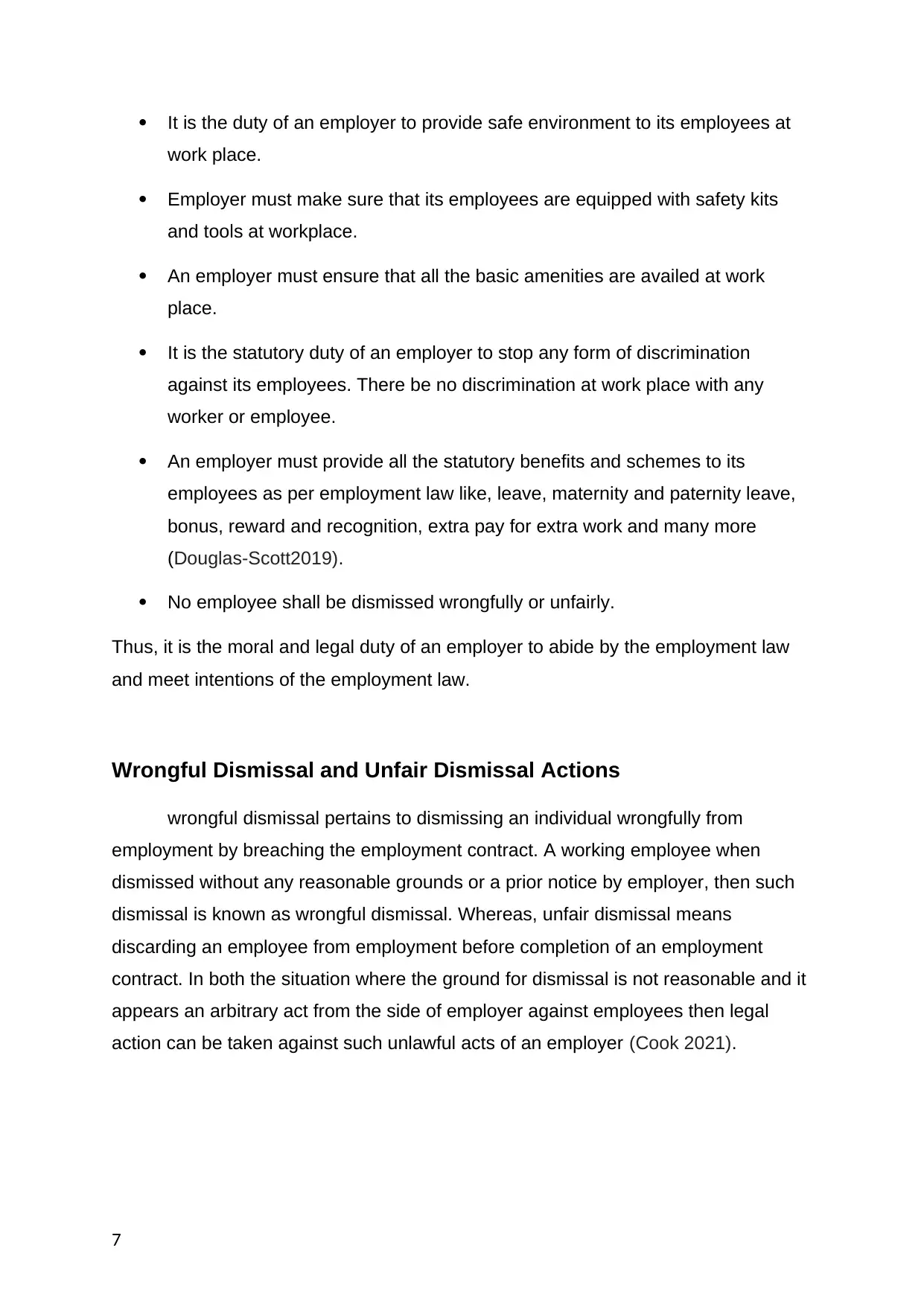
It is the duty of an employer to provide safe environment to its employees at
work place.
Employer must make sure that its employees are equipped with safety kits
and tools at workplace.
An employer must ensure that all the basic amenities are availed at work
place.
It is the statutory duty of an employer to stop any form of discrimination
against its employees. There be no discrimination at work place with any
worker or employee.
An employer must provide all the statutory benefits and schemes to its
employees as per employment law like, leave, maternity and paternity leave,
bonus, reward and recognition, extra pay for extra work and many more
(Douglas-Scott2019).
No employee shall be dismissed wrongfully or unfairly.
Thus, it is the moral and legal duty of an employer to abide by the employment law
and meet intentions of the employment law.
Wrongful Dismissal and Unfair Dismissal Actions
wrongful dismissal pertains to dismissing an individual wrongfully from
employment by breaching the employment contract. A working employee when
dismissed without any reasonable grounds or a prior notice by employer, then such
dismissal is known as wrongful dismissal. Whereas, unfair dismissal means
discarding an employee from employment before completion of an employment
contract. In both the situation where the ground for dismissal is not reasonable and it
appears an arbitrary act from the side of employer against employees then legal
action can be taken against such unlawful acts of an employer (Cook 2021).
7
work place.
Employer must make sure that its employees are equipped with safety kits
and tools at workplace.
An employer must ensure that all the basic amenities are availed at work
place.
It is the statutory duty of an employer to stop any form of discrimination
against its employees. There be no discrimination at work place with any
worker or employee.
An employer must provide all the statutory benefits and schemes to its
employees as per employment law like, leave, maternity and paternity leave,
bonus, reward and recognition, extra pay for extra work and many more
(Douglas-Scott2019).
No employee shall be dismissed wrongfully or unfairly.
Thus, it is the moral and legal duty of an employer to abide by the employment law
and meet intentions of the employment law.
Wrongful Dismissal and Unfair Dismissal Actions
wrongful dismissal pertains to dismissing an individual wrongfully from
employment by breaching the employment contract. A working employee when
dismissed without any reasonable grounds or a prior notice by employer, then such
dismissal is known as wrongful dismissal. Whereas, unfair dismissal means
discarding an employee from employment before completion of an employment
contract. In both the situation where the ground for dismissal is not reasonable and it
appears an arbitrary act from the side of employer against employees then legal
action can be taken against such unlawful acts of an employer (Cook 2021).
7
Paraphrase This Document
Need a fresh take? Get an instant paraphrase of this document with our AI Paraphraser
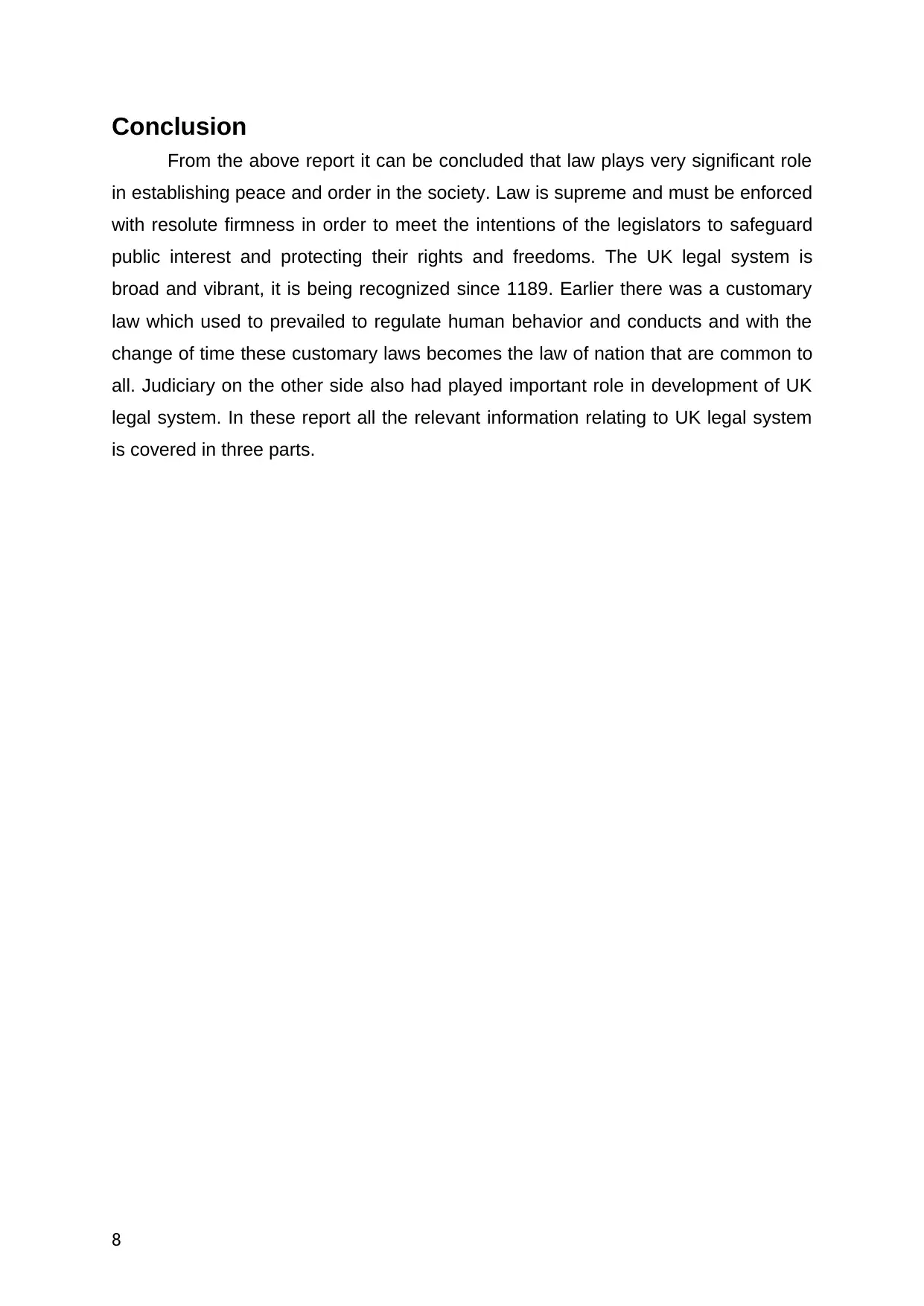
Conclusion
From the above report it can be concluded that law plays very significant role
in establishing peace and order in the society. Law is supreme and must be enforced
with resolute firmness in order to meet the intentions of the legislators to safeguard
public interest and protecting their rights and freedoms. The UK legal system is
broad and vibrant, it is being recognized since 1189. Earlier there was a customary
law which used to prevailed to regulate human behavior and conducts and with the
change of time these customary laws becomes the law of nation that are common to
all. Judiciary on the other side also had played important role in development of UK
legal system. In these report all the relevant information relating to UK legal system
is covered in three parts.
8
From the above report it can be concluded that law plays very significant role
in establishing peace and order in the society. Law is supreme and must be enforced
with resolute firmness in order to meet the intentions of the legislators to safeguard
public interest and protecting their rights and freedoms. The UK legal system is
broad and vibrant, it is being recognized since 1189. Earlier there was a customary
law which used to prevailed to regulate human behavior and conducts and with the
change of time these customary laws becomes the law of nation that are common to
all. Judiciary on the other side also had played important role in development of UK
legal system. In these report all the relevant information relating to UK legal system
is covered in three parts.
8
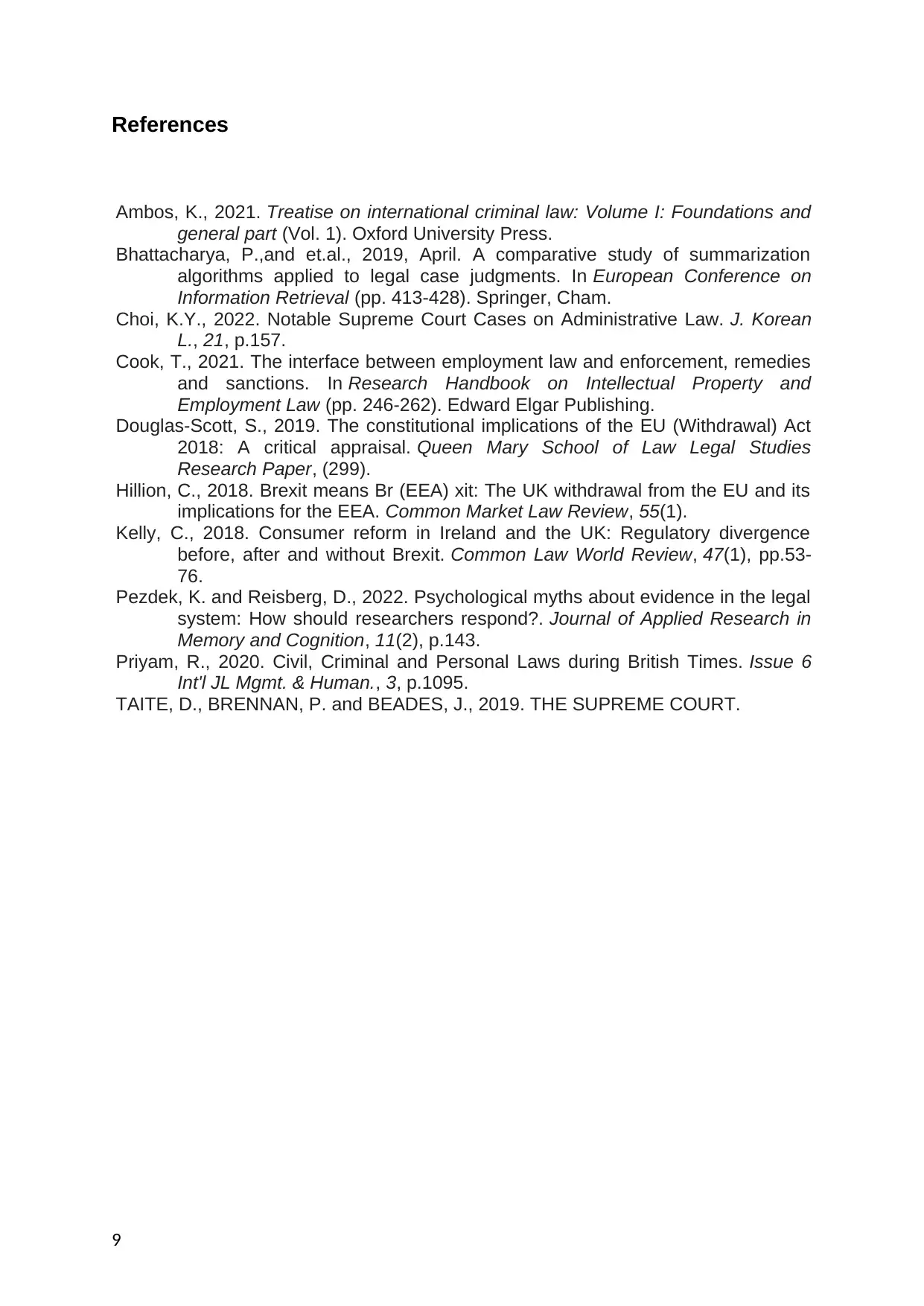
References
Ambos, K., 2021. Treatise on international criminal law: Volume I: Foundations and
general part (Vol. 1). Oxford University Press.
Bhattacharya, P.,and et.al., 2019, April. A comparative study of summarization
algorithms applied to legal case judgments. In European Conference on
Information Retrieval (pp. 413-428). Springer, Cham.
Choi, K.Y., 2022. Notable Supreme Court Cases on Administrative Law. J. Korean
L., 21, p.157.
Cook, T., 2021. The interface between employment law and enforcement, remedies
and sanctions. In Research Handbook on Intellectual Property and
Employment Law (pp. 246-262). Edward Elgar Publishing.
Douglas-Scott, S., 2019. The constitutional implications of the EU (Withdrawal) Act
2018: A critical appraisal. Queen Mary School of Law Legal Studies
Research Paper, (299).
Hillion, C., 2018. Brexit means Br (EEA) xit: The UK withdrawal from the EU and its
implications for the EEA. Common Market Law Review, 55(1).
Kelly, C., 2018. Consumer reform in Ireland and the UK: Regulatory divergence
before, after and without Brexit. Common Law World Review, 47(1), pp.53-
76.
Pezdek, K. and Reisberg, D., 2022. Psychological myths about evidence in the legal
system: How should researchers respond?. Journal of Applied Research in
Memory and Cognition, 11(2), p.143.
Priyam, R., 2020. Civil, Criminal and Personal Laws during British Times. Issue 6
Int'l JL Mgmt. & Human., 3, p.1095.
TAITE, D., BRENNAN, P. and BEADES, J., 2019. THE SUPREME COURT.
9
Ambos, K., 2021. Treatise on international criminal law: Volume I: Foundations and
general part (Vol. 1). Oxford University Press.
Bhattacharya, P.,and et.al., 2019, April. A comparative study of summarization
algorithms applied to legal case judgments. In European Conference on
Information Retrieval (pp. 413-428). Springer, Cham.
Choi, K.Y., 2022. Notable Supreme Court Cases on Administrative Law. J. Korean
L., 21, p.157.
Cook, T., 2021. The interface between employment law and enforcement, remedies
and sanctions. In Research Handbook on Intellectual Property and
Employment Law (pp. 246-262). Edward Elgar Publishing.
Douglas-Scott, S., 2019. The constitutional implications of the EU (Withdrawal) Act
2018: A critical appraisal. Queen Mary School of Law Legal Studies
Research Paper, (299).
Hillion, C., 2018. Brexit means Br (EEA) xit: The UK withdrawal from the EU and its
implications for the EEA. Common Market Law Review, 55(1).
Kelly, C., 2018. Consumer reform in Ireland and the UK: Regulatory divergence
before, after and without Brexit. Common Law World Review, 47(1), pp.53-
76.
Pezdek, K. and Reisberg, D., 2022. Psychological myths about evidence in the legal
system: How should researchers respond?. Journal of Applied Research in
Memory and Cognition, 11(2), p.143.
Priyam, R., 2020. Civil, Criminal and Personal Laws during British Times. Issue 6
Int'l JL Mgmt. & Human., 3, p.1095.
TAITE, D., BRENNAN, P. and BEADES, J., 2019. THE SUPREME COURT.
9
⊘ This is a preview!⊘
Do you want full access?
Subscribe today to unlock all pages.

Trusted by 1+ million students worldwide
1 out of 9
Related Documents
Your All-in-One AI-Powered Toolkit for Academic Success.
+13062052269
info@desklib.com
Available 24*7 on WhatsApp / Email
![[object Object]](/_next/static/media/star-bottom.7253800d.svg)
Unlock your academic potential
Copyright © 2020–2026 A2Z Services. All Rights Reserved. Developed and managed by ZUCOL.



